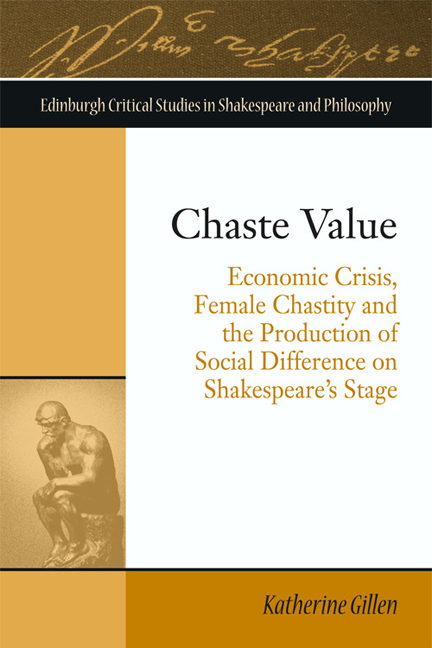 Chaste Value
Chaste Value Published online by Cambridge University Press: 22 December 2017
In her foundational study, Chaste Thinking: The Rape of Lucretia and the Birth of Humanism, Stephanie Jed argues that the rape sacrifice at the heart of the Lucretia myth promotes the fantasy that a purified, ‘chaste’ condition can be restored both to the female body and to the body politic once corrupting forces have been expelled. Jed notes that the myth employs a series of words related to the Latin tangere, ‘to touch’, and carere, ‘to be cut off from, to lack’. The most central of these words is chastity, which connotes the ‘quality of being cut off from contact or contamination’. Such cutting off is manifested not only in Lucretia's resistance to Tarquin but also in her suicide, which divorces her pure spirit from her contaminated body, as well as in Brutus's insistence that Lucretia's kinsmen redirect their mourning toward political rebellion. The freedom of the Roman Republic thus arises from the suppression of both body and emotion, with the figure of the sacrificed woman emblematising the righteousness of the cause and diverting attention from more morally ambiguous aspects of the revolution. The legend therefore encourages what Jed calls ‘chaste thinking’, a mode of thought that divorces a concept from the ideological messiness that undergirds it. In addition to providing the foundation for national origin stories, Jed contends, chaste thinking proves central to the humanist tradition that continually reproduces the Lucretia myth and that defines its literary and cultural value in contrast to more quotidian forms of expression, mercantile writing in particular.
This republican model of subject formation was adapted to the monarchical context of early modern England, where Elizabeth I's chaste body served as an analogue to the alternately vulnerable and impenetrable boundaries of the nation state and promoted an idealised – and pure – notion of English national identity. According to Arthur Little, Lucretia's sexual purity is associated with whiteness that is then conferred upon the state. As England expands its mercantile and colonial reach, therefore, the chaste thinking implicit in the Lucretia myth becomes ‘one of early modern England's most imaginative models for defining and negotiating its national and imperial self’. William Shakespeare's The Rape of Lucrece (1594) and Cymbeline (1611) are two of the many texts that explore the relevance of chaste thinking for early modern England.
To save this book to your Kindle, first ensure [email protected] is added to your Approved Personal Document E-mail List under your Personal Document Settings on the Manage Your Content and Devices page of your Amazon account. Then enter the ‘name’ part of your Kindle email address below. Find out more about saving to your Kindle.
Note you can select to save to either the @free.kindle.com or @kindle.com variations. ‘@free.kindle.com’ emails are free but can only be saved to your device when it is connected to wi-fi. ‘@kindle.com’ emails can be delivered even when you are not connected to wi-fi, but note that service fees apply.
Find out more about the Kindle Personal Document Service.
To save content items to your account, please confirm that you agree to abide by our usage policies. If this is the first time you use this feature, you will be asked to authorise Cambridge Core to connect with your account. Find out more about saving content to Dropbox.
To save content items to your account, please confirm that you agree to abide by our usage policies. If this is the first time you use this feature, you will be asked to authorise Cambridge Core to connect with your account. Find out more about saving content to Google Drive.